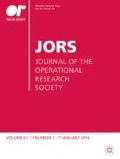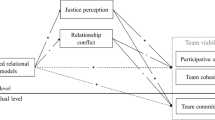Abstract
Stafford Beer created Team Syntegrity as a methodology for social interaction that predisposes participants towards shared agreement among varied and sometimes conflicting interests, without compromising the legitimate claims and integrity of those interests. This paper outlines the methodology and the underlying philosophy, describing several applications in a variety of countries and contexts, indicating why such an approach causes us to re-think more traditional approaches to group decision processes, and relating Team Syntegrity to other systems approaches.
Similar content being viewed by others
References
Ackoff R (1981). Creating the Corporate Future. John Wiley: New York.
Ackoff R (1999). Re-creating the Corporation: A Design of Organizations for the XXI Century. Oxford University Press: New York.
Beer S (1979). Heart of the Enterprise. John Wiley: Chichester.
Beer S (1981). Brain of the Firm, 2nd edn.. John Wiley: Chichester.
Beer S (1994). Beyond Dispute: The Invention of Team Syntegrity. John Wiley: Chichester.
CGR (1997). El Manifiesto de Gorgona. Contraloria General de la Republica Direccion Editorial: Bogota.
Checkland P (1981). Systems Thinking, Systems Practice. John Wiley: Chichester.
Checkland P and Scholes J (1990). Soft Systems Methodology in Action. John Wiley: Chichester.
CIDER (1998). Informe final Reunirse. Inter-American Development Bank: Bogota.
Espejo R and Schwaninger M (1997). To Be or Not to Be That is the System: A tribute to S. Beer. Syncho Ltd: Birmingham.
Espinosa A (2000). Creating a democratic learning context: an experience in the use of Syntegration for this purpose. In: Proceedings of the World Congress of the Systems Sciences in conjunction with 44th Annual Meeting of the International Society for the Systems Sciences. Ryerson Polytechnical University: Toronto.
Espinosa A (2003). Team Syntegrity as a tool to promote democratic agreements: an example from the National Environmental Sector in Colombia. In: Proceedings of the 47th Annual Meeting of the International Society for the Systems Sciences e ‘Agoras of the Global Village’. Crete: 03(003).
Espinosa A and Mejia A (2003). Team Syntegrity as a learning process: some considerations about its capacity to develop critical active learners. In: Proceedings of the 47th Annual Meeting of the International Society for the Systems Sciences ‘Agoras of the Global Village’. Crete: 03(100).
Fuller R Buckminster (1976). And it Came to Pass – Not to Stay. Macmillan: New York.
Fuller R Buckminster (1979). Synergetics: the Geometry of Thinking. Macmillan: New York.
Jackson M (2003). Systems Thinking. Creative Holism for Managers. John Wiley: Chichester.
Mason R and Mitroff I (1981). Challenging Strategic Planning Assumptions: Theory, Cases, and Techniques. John Wiley: New York.
Maturana H and Varela F (1980). Autopoiesis and Cognition: The Realisation of the Living. Readel: Dordrecht.
Maturana H and Varela F (1988). The Tree of Knowledge: The Biological Roots of Human Understanding. Shambala: Boston.
Mejia, A, and Espinosa A (2006). Team Syntegrity as a learning tool: some considerations about its capacity to promote critical learning. Systems Res Behav Sci (in press, doi: 10.1002/sres.743).
Pfiffner P (2001). Team Syntegrity: using cybernetics for opinion forming in organizations. MOM Malik Mngt 5(01/9): 80–82.
Schwaninger M (1997). Self-organisation and self-reference in the cognition of organisations. In: Braitenberdg V, Radermacher F and Josef (eds). Interdisciplinary Approaches to a New Understanding of Cognition and Consciousness. Unipress: Die Zoltscrhrilft des Universitat Augsburg.
Schwaninger M (2002). Enhancing organizational cognition. SEM/Radar: Systemdenken Entscheldungsfinung Mngt 01: 71–93.
Stadelman P (2001). Team Syntegrity: scientifically based way for integrating the distributed knowledge to find solutions. MOM Malik Mngt 5: 72.
Ulrich W (1983). Critical Heuristics of Social Planning: A New Approach to Practical Philosophy. John Wiley: Chichester.
Ulrich W (1991). Critical heuristics of social systems design. In: Flood R and Jackson M (eds). Critical Systems Thinking: Directed Readings. John Wiley: Chichester pp 103–115.
Vickers G (1983). Human Systems are Different. Harper and Row: London.
White L (1994). Let's Syntegrate! A report on a novel approach to group decision making in the ‘New Times’. OR Insight 7 (1): 13–18.
White LA (1998). Tinker, tailor, soldier, sailor: a syntegrity to explore London's diverse interests. OR Insight 3: 12–16.
White L (2002). Size matters: large group methods and the process of operational research. J Opl Res Soc 53 (2): 149–160.
Acknowledgements
Thanks to Professor M Jackson, who one of the authors worked with an earliest paper related to this research and to Dr J Walker for his continuous support and comments.
Author information
Authors and Affiliations
Corresponding author
Rights and permissions
About this article
Cite this article
Espinosa, A., Harnden, R. Team syntegrity and democratic group decision making: theory and practice. J Oper Res Soc 58, 1056–1064 (2007). https://doi.org/10.1057/palgrave.jors.2602261
Received:
Accepted:
Published:
Issue Date:
DOI: https://doi.org/10.1057/palgrave.jors.2602261




